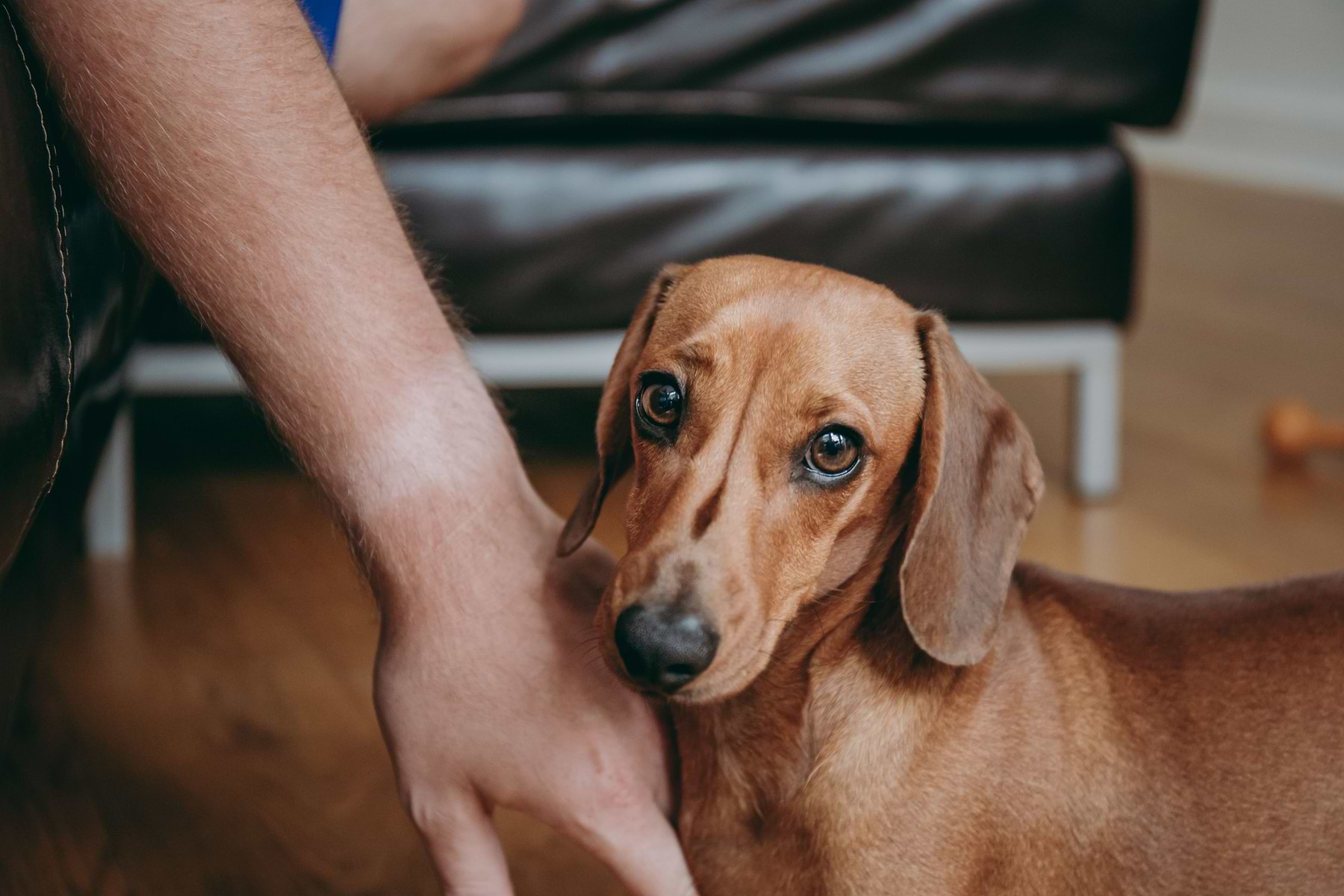
Dogs have a lot of behaviors that new pet parents have to come to terms with as they train their puppies. Licking, chewing, and jumping are all common, but so is biting. In fact, some dogs may seem to bite more than they do anything else!
So, why do dogs bite? Is it for one reason or many? Let’s answer these questions and more in a complete guide and breakdown of how you can train your dog to bite less frequently or only when it’s appropriate.
Fear or Anxiety
Some dogs may resort to biting if they experience intense fear or anxiety. Just like people can lash out if they are afraid for their personal safety, so too can dogs.
However, fearful bites from dogs are not normally as intense or prolonged as bites from anger or aggression. In many cases, a dog will only bite once or twice if they are doing so out of fear in an attempt to deter whatever is scaring them.
For example, a dog who hates the vet’s office may attempt to bite the hand of a vet who holds them, but they may only do so once or twice before giving up. Like all kinds of bites, the level of biting a dog might attempt when they are scared will vary heavily depending on their age, breed, personality, and so on.
Anger or Aggression
As noted above, many dogs will also bite out of anger or aggression. Aggressive dogs may attack other dogs or people if they think that their territory is being infringed, if they think their food or toys are being stolen, or for other reasons.
Aggressive bites might be accompanied by chewing and tearing, as the goal for the dog is to cause damage directly, not to simply make a scary object or person go away. Pet parents need to be very good about training their dog not to bite out of aggression; failing to do so could lead to serious legal issues or behavioral problems down the road.
Feeling Unwell
Have you ever felt sick to your stomach or generally unwell? You’ve probably been less able to handle irritations or annoyances, whether they were at work or at home. Some folks may even feel like they will just snap if they get frustrated one more time when they are sick!
Dogs can be the same way. Some pups will indeed bite, even at a friendly hand or a treat, if they are feeling unwell because of sickness, chronic pain, or injury. Many dogs have an inherent instinct to defend themselves if they are wounded, so it’s not uncommon for them to bite at veterinarian hands or others if they retreat into a corner to lick their wounds.
Not all dogs will do this, of course. But it’s important to always approach your dog cautiously if they have been seriously hurt or are sick. Even if your dog loves you and is perfectly fine most of the time, they might snap at you if you aren’t careful or if you approach too quickly when they’re not feeling their best.
Play Biting and Nipping
Many pet parents also notice that their dogs bite when they are puppies, especially when they are playing. Play biting or nipping is a natural part of puppy development, although it’s also something they should normally grow out of.
Play biting and nipping is part of how dogs communicate with each other and get each other’s attention. Furthermore, it’s important for puppies to play-bite with one another so they learn bite inhibition properly.
Puppies will bite people or their parents when they are playing, as well, particularly when they are very young. This play-biting doesn't necessarily mean that your dog is being aggressive or mean. It might just mean that they don't know how to moderate their bite strength quite yet.
Attention-Getting
Lastly, some dogs will also bite in order to get the attention of their pet parents, siblings, or anyone else. This behavior is a little less common, as dogs are more likely to use other behaviors to get attention, like licking, whining, or jumping.
But if you feel a curious nip at your fingertips when you’ve been ignoring your dog, now you know why.
Do Dogs Stop Biting as They Get Older?
Generally, yes.
As your dog becomes socialized—both through interacting with you and other humans and through interacting with other dogs—they will bite less. Your dog will gradually learn that biting carries the potential to return an aggressive response.
For example, a puppy may nip another dog they are playing with, only to bite a little too hard. The dog they are playing with then growls at them and tells them to back off. In this way, the puppy learns that other behaviors are better for playing or communicating.
Furthermore, puppies become better at moderating their emotional responses as they get older, just like we do. Your dog may stop biting for attention or even out of aggression as they learn to control themselves and as they trust you more fully.
It's not uncommon for well-socialized dogs to completely relax in the arms of their parents, even if they are injured, with nary a nip to be seen. That said, dogs have to be taught not to bite or to moderate their biting behavior if you hope to see them stop chewing on things they shouldn’t.
What Affects Dog Biting Behavior?
Several factors can influence a dog’s biting behavior and frequency, including:
- Their breed. Some dog breeds are more likely to bite, especially out of aggression
- Their age. Puppies are more likely to bite than older dogs
- Their unique personality. Regardless of breed, some dogs are simply more likely to bite than others.
How To Stop Your Dog from Biting Inappropriately
What if you have a bite-happy puppy who just loves to nip at your fingers or bite things when they shouldn’t? Or, what if you just want to prevent them from getting a bad habit of biting when they shouldn’t?
In these cases and more, you can teach your dog to stop biting inappropriately. Doing so relies on practicing two big behaviors.
Bite Inhibition
First and foremost, your dog needs to learn bite inhibition. Puppies naturally learn bite inhibition when playing with other dogs or their parents. They bite a little too roughly, and their parent or sibling growls at them and bites back.
Bite inhibition can also be learned through your dog’s interactions with you, but you shouldn’t growl at them or bite back! Instead, you can teach bite inhibition through this basic game:
- Allow your puppy to bite your fingers or hand
- As soon as the puppy bites a little too hard and causes a bit of pain, yell “Ouch!” and withdraw your hand
- Look straight into your puppy’s eyes as you do this. Odds are your dog will realize that they did something wrong and wag their tail to try to make up for it
- Give your dog your hand again and allow them to repeat the process. You should yelp or tell them “ouch” as soon as you feel the slightest hint of pain. That way, your dog learns just how hard they can bite before it causes discomfort
Over time, this bite inhibition training sequence should teach your dog not to bite too roughly, especially when playing with other people.
No Biting on Skin
Next, teach your puppy not to bite your hand at all by using positive reinforcements and treats.
- Hold your hand near your side and allow your puppy to bite your finger
- When they do so, say “no biting” or any other command word you choose
- As soon as your dog stops trying to bite your hand, give them a treat and praise them
The idea is to reward your dog for resisting the urge to bite your hand, even if they want to play or are trying to get your attention.
If your dog fails to respond immediately to this training sequence, ignore them by crossing your arms and turning away. The best “negative” reinforcement you can give your dog is simply to withhold attention. Never growl at or strike your dog. Doing so could cause negative feelings to develop or make your dog scared of you, which could actually make them more likely to bite you over time.
Summary
As you can see, dogs bite for several reasons. They might be injured, not feeling well, irritated, or maybe they just want to play or get attention. But no matter the reason, you need to teach your dog not to bite frequently or not to bite hard unless they are defending themselves.
Plus, you’ll want to enjoy your walks with your dog, even if you pass by another pup on the street. You can do wonders for your dog’s mental health and emotional well-being by furnishing them with the best crate, bed, and walking supplies you can find. That’s why Diggs offers each of these pet parent tools and more; check out our online store today!
Sources:
Why do dogs bite? | American Veterinary Medical Association
Mouthing, Nipping and Play Biting in Adult Dogs | ASPCA
Mouthy Pups – It's Normal. Let's Teach Them Bite Inhibition. | Seattle Humane

The Diggs Team
We believe our dogs deserve safer, better designed pet products.
You might also like
Crate training tips, stories and inspiration
View all blogsIn Your Diggs
Share your photos with #DiggsPet and tag us @DiggsPet on IG and TikTok.


